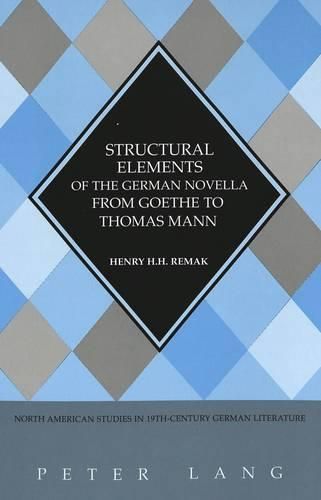Readings Newsletter
Become a Readings Member to make your shopping experience even easier.
Sign in or sign up for free!
You’re not far away from qualifying for FREE standard shipping within Australia
You’ve qualified for FREE standard shipping within Australia
The cart is loading…






This comprehensive, bilingual study tests principal theoretical elements of the German Novella, and their variations, through its richest period, against relevant aspects of representative texts from Classicism (Goethe, Schiller, Wieland, Hebel), Romanticism (Kleist, Tieck, E.T.A. Hoffmann, Arnim, Brentano), Realism (Droste, Gotthelf, Keller, Meyer, Raabe, Storm), Naturalism (Hauptmann) to Psychological Realism (Hofmannsthal, Thomas Mann, Kafka, Stefan Zweig, Musil), Neo-Classicism (Emil Strauss, Bergengruen, Andres), Neo-Pastoralism (Wiechert), and the Neo-Baroque (Grass). Romance influences (Boccaccio, Cervantes, Marguerite de Navarre, Italy as such) are considered. Written with both students and scholars in mind, Structural Elements of the German Novella from Goethe to Thomas Mann avoids jargon and contains comprehensive indices.
$9.00 standard shipping within Australia
FREE standard shipping within Australia for orders over $100.00
Express & International shipping calculated at checkout
This comprehensive, bilingual study tests principal theoretical elements of the German Novella, and their variations, through its richest period, against relevant aspects of representative texts from Classicism (Goethe, Schiller, Wieland, Hebel), Romanticism (Kleist, Tieck, E.T.A. Hoffmann, Arnim, Brentano), Realism (Droste, Gotthelf, Keller, Meyer, Raabe, Storm), Naturalism (Hauptmann) to Psychological Realism (Hofmannsthal, Thomas Mann, Kafka, Stefan Zweig, Musil), Neo-Classicism (Emil Strauss, Bergengruen, Andres), Neo-Pastoralism (Wiechert), and the Neo-Baroque (Grass). Romance influences (Boccaccio, Cervantes, Marguerite de Navarre, Italy as such) are considered. Written with both students and scholars in mind, Structural Elements of the German Novella from Goethe to Thomas Mann avoids jargon and contains comprehensive indices.